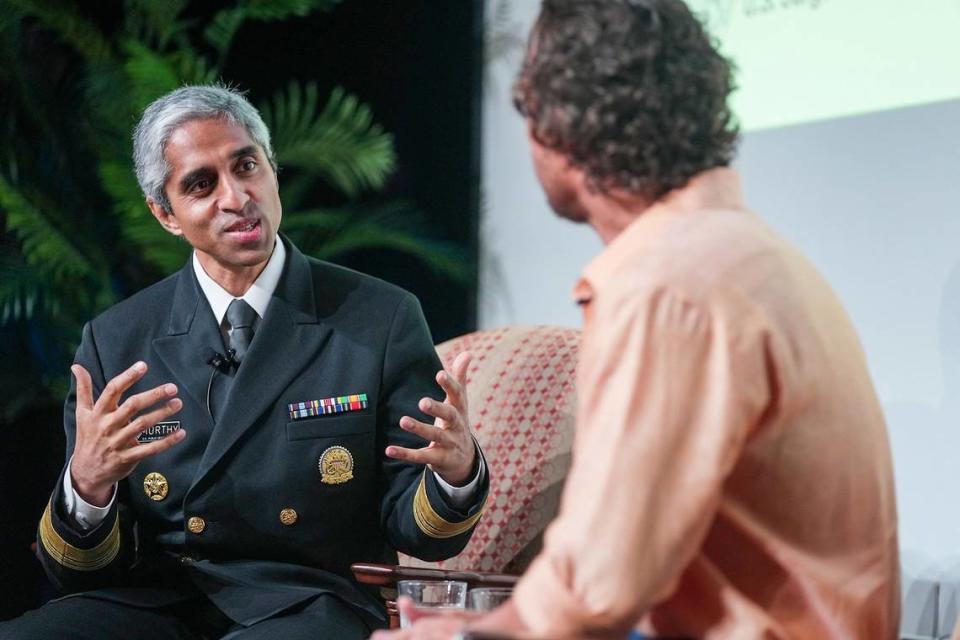Warning labels alone won’t protect young people from the underside of social media | Opinion
Surgeon General Vivek Murthy’s recent call for warning labels on social media is a good idea. He notes that children who spend significant time on social media are at risk for mental illness. Murthy concludes, “The moral test of any society is how well it protects its children.”
But how best should we protect kids? Murthy recognizes that a warning label is a simple solution to a complex problem. Last year, his office issued a more detailed report noting that schools, parents, policymakers, and technology companies have a role to play in protecting kids. And long-term solutions depend upon education.
There is probably also a role for prohibitions. Smartphones have been banned in schools in Fresno and recently in Los Angeles. This week, Governor Newsom called for a statewide smartphone ban in California schools. Social media and smartphones are not the same thing. However, a school ban on smartphones is effectively a ban on social media during school time.
Opinion
Tools and technologies can be employed in good or bad ways. A hammer can be used to build or to destroy. Prohibitions are justifiable when the risks are obvious and severe, and when the purported benefits of a tool are unclear. And with kids, their relative immaturity matters. A ban on social media access for kids might be justifiable and there is some wisdom in prohibiting smartphones at school. But at this point, a ban on these technologies is akin to closing the proverbial barn door once the horse has already galloped off.
People disagree about the risks and benefits of various technologies. One might argue against these bans by claiming that these technologies are more beneficial than dangerous. These tools help us stay connected, access the news, and conduct business. Of course, these tools also provide instant access to cyberbullying, exploitation, scams, and disinformation. But there is some truth to the claim that with smartphones and social media, it’s not the tool that is to blame, but how it is used.
Some technophobes are opposed to any innovative tool. Calculators were once viewed with skepticism, as was the Internet. These days technophobes are worried about artificial intelligence. But skeptics often adapt to new technologies, when their safety and usefulness are proven.
Hard-core libertarians resist every effort at prohibition. The recent Supreme Court case allowing “bump stock” weapons is worth mentioning here. The decision depends upon a technical matter involving trigger mechanisms. But the bigger question, not decided in this case, is whether there should be limits on dangerous weapons or whether individuals have a right to own even very dangerous weapons.
Social media and smartphones do not seem as dangerous as machine guns. So, it is easy to imagine a libertarian argument against Newsom’s proposed ban. Furthermore, social media is useful for kids. It’s how they socialize, organize clubs and teams, and how they communicate with each other and even with their parents. Smartphones can be useful in education when used properly to access information.
An outright ban may take away useful tools. And a school ban will have no impact on after-school usage. But there is no doubt that education is part of the solution. Teenagers must take driver’s ed and pass a licensing test to drive. Perhaps a similar training course and qualifying exam could be created for social media and smartphones.
Kids need critical lessons about cyberbullying, peer pressure, the bandwagon effect, and the power of misinformation and exploitative algorithms. They also need frank examples of the dangers of social media and smartphone addiction. They would benefit from a training course that includes lessons in “digital citizenship,” “ethical A.I.,” and “virtuous virtual reality” that encourage best practices online and good moral habits in cyberspace.
A Surgeon General’s warning is only a starting point for a broader conversation. We need to continue this conversation. A ban at school might help. But the social media and smartphone horse is already out of the barn. Kids need to be taught the skills and virtues that are required to ride that horse without getting hurt.
Andrew Fiala is a professor of philosophy and director of The Ethics Center at Fresno State. Contact him at fiala.andrew@gmail.co m



